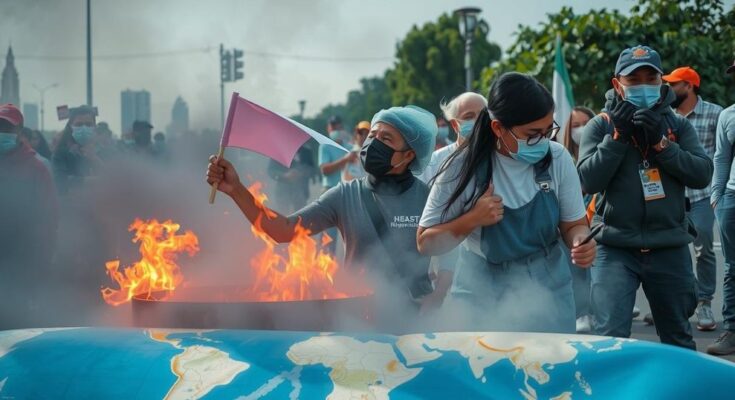Globally, the criminalization and repression of climate and environmental protests are intensifying, marked by anti-protest laws, legal prosecutions, harsher policing, and, in extreme cases, murders of activists. This trend signifies a concerted effort to silence dissent in both democratic and authoritarian contexts, as governments fail to take adequate measures for climate action. Recent data show a marked rise in protests, yet activists face significant challenges, including heightened risk of violence and prosecution.
The suppression of climate and environmental protests has become a notable global trend, as evidenced by recent research from the University of Bristol. This trend, which spans both democratic and authoritarian regimes, is marked by the criminalization of activists and their movements worldwide.
The distinction between climate protests, generally directed at global scale emissions issues, and environmental protests, usually targeting specific destructive projects, is critical. Recent legislative measures, steep penalties, and court challenges signify an increased threat level facing activists globally, irrespective of regional differences.
Four principal tactics characterise this repression: 1) the implementation of anti-protest laws that empower police and expand criminal classifications, 2) legal prosecution of activists under laws initially designed for terrorism, 3) increased policing strategies that often involve violence, and 4) extreme outcomes such as killings of activists. Data compilation via the Armed Conflicts Location Event database indicates a persistent rise in protest activities since 2018-2019, with significant disparities in the intensity and nature of police response across different nations.
Countries such as Australia and Canada exhibit high arrest rates during climate protests, while others like Peru and Uganda experience heightened police violence. Amidst this atmosphere of repression, civil society remains vital to holding governments accountable for their climate action failures. The targeting of environmental activists effectively depoliticizes their cause, overshadowing their rightful demands for urgent climate remedial action.
The escalation of repression against climate and environmental protests reflects a broader trend observed globally. Stringent legal frameworks, combined with aggressive policing tactics, have increasingly limited activists’ ability to voice concerns regarding environmental degradation and climate change. This phenomenon occurs in a context where governments fall short of adequate climate action, rendering activists vulnerable to systematic silencing. The findings highlight the necessity for international awareness and advocacy in support of environmental protection and activism.
The trends of criminalization and repression against climate and environmental protests reveal a troubling landscape for activists globally. Various nations are adopting and implementing measures that challenge the very essence of public demonstration and dissentation. This situation demands urgent attention, as activists endeavor to address pressing climate-related issues while facing intimidation and legal obstacles. A renewed commitment to protect individual rights for expression and advocacy is vital in pursuit of sustainable environmental policies.
Original Source: theconversation.com




